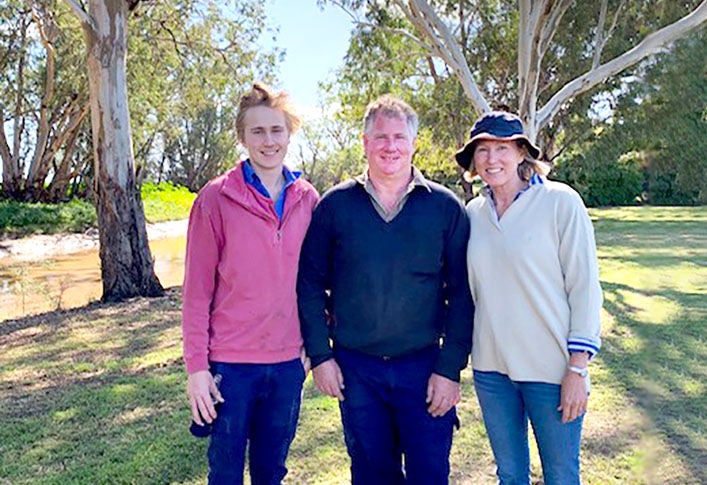Posted by on
01/12/2022
Whilst curious to learn more about the carbon opportunity potential on their Warren district property, Alexandra Ramsay admits it can be an overwhelming, and often confusing, proposition.
However, having recently attended Rabobank’s Central NSW Carbon Training Workshop, she’s grateful to now have a basic understanding – and realises just how much there is to learn.
“I very much enjoyed the workshop, presented by Dr Carly Green, and over two days we were given an excellent overview of the history, policy, government and market drivers of why, and then how, we could reduce and mitigate greenhouse gas emissions.”
The workshop was one of a nation-wide suite of Carbon Farming and Carbon Neutral Workshops hosted by Rabobank, aiming to declutter the carbon conversation, and help build knowledge on the fundamentals of carbon in farming.
Crawford Taylor, Rabobank Head of Sustainable Business Development, said the workshops provided an opportunity to lay the foundation for farmers and staff in understanding the pathways towards a low emission, or potentially carbon neutral, farm business.
“There is plenty of discussion around the agricultural industry’s ability to sell carbon credits to other industries for diversification of farm income, or whether producers should focus on their own carbon emissions. Our clients are curious as to how they fit in,” Crawford says.
“Before farmers consider their options, a thorough understanding of their greenhouse gas emissions is key, and strategically imperative for a farm business.”
As such, the workshops provide an opportunity for clients – armed with their own detailed on-farm data – to measure their carbon emissions footprint using the Greenhouse Accounting Framework developed by the University of Melbourne.
The workshops afforded attendees the opportunity to run various spreadsheets to determine the status of their individual properties, and for a mixed operation such as Alexandra and husband David, the process was not straightforward.
“Having a combination of irrigation, dry land cropping, cattle and sheep meant we had to separate each venture,” she explained. “Then, if we were to compare ourselves to other similar enterprises there were a number of considerations such as the use of contractors versus using your own gear, which would impact figures for inputs such as fuel greatly.”
The opportunity to go through their figures and scenarios with dedicated specialists, and other farmers all learning together, was, she believed, extremely valuable in helping understand the basics.
She said the fact that attendees were from a large range of Australian farming enterprises, both intensive and extensive, all learning together, was encouraging.
“I really enjoyed the conversations and questioning we had in the group setting, there were plenty of ‘ah-ha’ moments between us all.”
Alexandra and David’s son Tom also attended the workshop, and as a next-generation farmer believed it was imperative to gain an understanding of what the ever-evolving carbon future may look like.
“I found the workshop fascinating, and appreciated the fact that it was specifically targeted to Australian farmers, so the information was practical, and valuable.
Having recently completed an economics degree, with a minor in geography, from the University of Sydney, Tom said he’d done quite a lot of learning in the carbon space, but rarely was it prepared specifically for Australian farmers, nor delivered directly to them in such an interactive knowledge-sharing space.
Moving forward, together
“Farms are a source of emissions, whether it’s through livestock or cropping, and they can also sequester and be a sink for carbon through vegetation,” Crawford explains. “The completion of the carbon calculator enabled clients to obtain an understanding of where they sit.”
“There is an inevitable imperative for agriculture to start working towards the low emissions production systems, with most supply chains targeting this by 2030.”
“While many farmers are aware of the imperative, they are unaware of how to move forward.”
Certainly, from the workshop Alexandra said it was very clear that at a global level major changes had to happen very quickly.
“We discussed the difficulties in what we were aiming for - so many terms are thrown around such as carbon neutral, carbon sequestration, ERF, emission intensity and ACCUs,” she said. “The picture is complex, and enormous.”
On their own property, Alexandra said she was looking forward to now exploring some of the technology available to reduce cattle methane production, and simply planting more trees.
“For an operation such as ours, a decrease in the use of nitrogen fertiliser and diesel are probably two main areas we can work on in our farming,” she said. “Increasing our fertiliser efficiency, and reducing fuel use would be as economically beneficial as it is environmentally beneficial so it also makes good business sense.”
Identifying opportunity
“Increasingly local and global agribusiness, and food and beverage companies are adopting sustainability commitments which include lowering, or achieving, net neutral carbon emissions in their supply chains.”
“This will mean greater collaboration with producers, who hold the keys to sustainability data from the ground up, and have the potential to implement investments and practice change.”
Global food and beverage companies marketing lower or greenhouse gas neutral products, such as beef and beer, exemplify new opportunities for Australian producers, Crawford says.
Alexandra said the workshop helped in her understanding of where Australia sits globally, and how local agriculture can change and adapt.
“We all want to be carbon farmers - to minimise GHGe, maximise carbon sequestration in the landscape, while improving the productivity and resilience of agricultural systems - however the ways, means and measuring how are not easy, but starting and success is essential.”
For more information on Rabobank’s carbon farming and carbon neutral workshops please call your local Rabobank branch.
